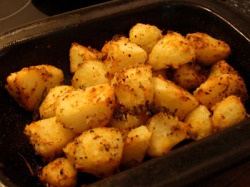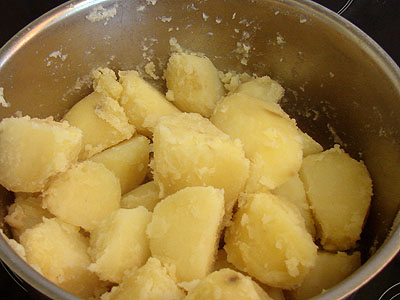Crispy Herbed Potatoes

Although it’s a little bit more time-consuming, and uses a bit more energy, parboiling potatoes before roasting them, I absolutely recommend it because it just gives you the greatest roast potatoes ever. Bugger the electricity bill, bugger the carbon footprint – just cook your potatoes this way and ENJOY it!
What’s parboiling? Well, I will explain.
What do I need?
- 750g-1kg of potatoes (judge for yourself how much you think is enough for everyone)
- A good splash of olive oil
- 2 or 3 cloves of crushed garlic (never skimp on garlic!)
- Sprig of thyme (if you have it, lemon thyme is even better)
- Sprig of rosemary
- Small bunch of sage leaves (I don’t know – maybe 6 or so?)
- 1 or 2 tsp dried oregano (oregano is one herb that I generally prefer to use dried)
- Cracked black pepper
- Salt (rock salt if you have it)
If you don’t have fresh herbs to hand, use about:
- 1/4 to 1/2 tsp dried thyme (at most – dried thyme can easily be overpowering)
- 1 tsp dried rosemary
- 1 tsp dried sage
What do I do?
Heat the oven to moderate to high-ish (180°-200°C, depending on your oven).
Put a pot of water (big enough to hold the potatoes) on to boil, while you wash and peel the potatoes. Once the water’s boiling, chuck the potatoes in to boil.
*Not literally “chuck” them in – you obviously don’t want boiling water splashing all over the place! Another tip for boiling things – use a lid. This traps heat inside the saucepan, which does save quite a bit of energy. You’ll need to turn the heat right down, or everything will boil over. Turn it down low enough that the water is just bubbling nicely – after a bit of practice, you’ll get to know where the sweet spots on your stove dials are. Try keeping a pot boiling with and without a lid, and notice the difference in the heat settings.
Boil the potatoes just long enough that they are starting to soften on the outside, but aren’t cooked through. If you cook them fully, they’ll turn to mush when you try and roast them. Poke them with a knife or skewer and if you feel just the top couple of millimetres softened, but underneath still firm, that ‘s all you need.
While the potatoes are cooking, combine the oil, garlic and dried herbs in a small bowl, with cracked black pepper and salt to taste. I like to use rock salt, because it seems to cling to the potatoes and crisp them up even more.
Drain the potatoes, and leave the pot sit with the lid off for a minute or so, so the potatoes dry. Then put the lid back on, and holding the lid on tight, give the pot a vigourous couple of shakes, so the potatoes get good and bashed around. Take off the lid and have a look: they should be a bit rough and flaky. Give a few more shakes if you want to rough them up a bit more. If they’re parboiled properly, they should roughen up without falling to pieces.
Empty the potatoes into the baking dish. Toss in the oil, garlic and herb mix, and then crush, tear, strip any sprigs of fresh herbs into the dish as well. Toss the whole lot so the potatoes and the oil and seasoning are well mixed, then put it into the oven to roast.
Because you’ve already mostly cooked the potatoes, what you’re really wanting the oven to do is turn them all crisp and golden. That’s why I generally have the temperature a little higher than I normally would – although beware if you’ve got anything else, like a roast, cooking in the oven as well.
If I do have a roast or something in the oven, what I often do is cook it at normal temp, and when that’s done, take it out and cover it to keep warm, while I turn the oven up full-bore (between 200° -220°C) for 5 minutes or so and really crisp things up.
If you do cook them on a higher than usual temperature, just watch that they won’t need as long to cook, and make sure you don’t burn them to a crisp.


Trackbacks